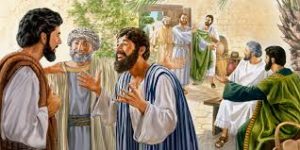The Early Response to Jesus’ Miracles
John 2: 23-25
The early response to Jesus’ miracles DIG: Why does Jesus not entrust Himself to the crowds? Did everyone believe in His name? None? What were they responding to? His message or His miracles? What did faith have to do with any of this?
REFLECT: When have you trusted someone only to be let down? How did that experience affect you later on? How can you protect yourself without withdrawing from society? How much do you need the approval of others? If so, why? Do you seek to please an audience of One?
Now while He was in Jerusalem at the Passover Festival (Yochanan 2:23a). This is the first of four Passovers mentioned in the ministry of Jesus. The first is mentioned here and in John 2:13a. The second is in John 5:1, the third is in John 6:4, while the fourth is referred to in John 11:55, 12:1, 13:1, 18:28 and 39, and 19:14. By dating these, we are able to conclude that His public ministry lasted three-and-a-half years. The gospel tradition suggests that Yeshua’s ministry began shortly after the Baptist’s. Luke says that our Lord was about thirty years of age when His ministry began (Luke 3:23). If Jesus was born in the winter of 7 or 6 BC, He would have been 33 or 34 in 29 AD (to see link click Aq – The Birth of Jesus). He performed miraculous signs, not to convince skeptics or sway dissenters, but to signal Messiah’s arrival. He offered signs to prompt willing, prepared hearts to respond to the Good News.

Many people saw the signs He was performing and believed in His name (John 2:23b). They walked by sight and not by faith; they believed in the signs, but not in the Lord. They didn’t believe in Him, just in His name. The miracles Yeshua performed excited them, but they were not ready to acknowledge their sin and repent. The verb believed is in the aorist tense. In other words, many people came to a point of decision, but did not cross over the line from intellectual knowledge about Yeshua to faith. The writer of Hebrews spoke of this (see the commentary on Hebrews As – Today, If You Hear His Voice, Do Not Harden Your Hearts). The Holy Spirit here says to the Hebrews who were on the edge of decision – but had never made a commitment, “Do not harden your hearts, hear today and do today what God wants you to do. Don’t do what the children of Isra’el did even after they had seen proof of God’s power and care for forty years. They continued to disbelieve in Him. Don’t do that.”
But, Jesus wasn’t depending on a favorable response from anyone, from the religious leaders to the masses. He would not entrust Himself to them, for He knew all people (John 2:24). What an indictment of the total depravity of mankind. This does not mean that the lost are totally insensitive in matters of the conscience, or that mankind is as sinful as they can possibly be. Nor does it mean that the sinner engages in every possible form of sin. But it does mean, and is evidenced by what God saw, that the lost are truly slaves to sin (Rom 6:1-23), and completely unable to free themselves from their sinful condition. In the garden of Eden, Adam showed that man after the flesh is not to be trusted. As another has said, “Man’s affections may be stirred, man’s intelligence informed, man’s conscience convicted; but still God cannot trust him.” Mankind in the flesh is condemned and must be born again. That is why the Master would not entrust Himself to them.328
The Lord’s example here should be a warning to us all. We would do well to remember that all that glitters is not gold. It is not wise to trust in someone you’ve known for only a short time. We should be kind to all, but confidential with only a few. In other words, do you put yourself too quickly in the power of others? When the Galilean Rabbi sent out the twelve apostles He warned them not to be naive, saying: I am sending you out like sheep among wolves. Therefore, be as shrewd as snakes and as innocent as doves (Matthew 10:16). In Egyptian hieroglyphics, as well as in much ancient lore, snakes symbolized wisdom. They were considered to be shrewd, smart, cunning and cautious. In that characteristic, at least, believers are to emulate snakes. We are to be shrewd and cunning in dealing with the unbelieving world around us.329
He did not need any testimony about mankind, for He knew what was in the heart of each person (Yochanan 2:25). Messiah knew human nature. He knew the fickleness and instability of the human heart. He wasn’t running for election, and He didn’t entrust His mission or His future to humanity. He trusted His Father, and then He invited humanity to trust Him.330 And the Nazarene will know the heart of such a man next in Nicodemus.



Leave A Comment